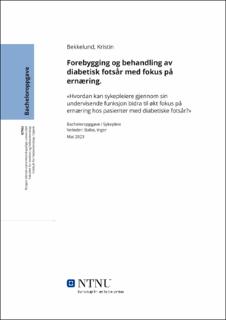| dc.contributor.advisor | Balke, Inger | |
| dc.contributor.author | Bekkelund, Kristin | |
| dc.date.accessioned | 2023-07-01T17:19:25Z | |
| dc.date.available | 2023-07-01T17:19:25Z | |
| dc.date.issued | 2023 | |
| dc.identifier | no.ntnu:inspera:139478172:147586089 | |
| dc.identifier.uri | https://hdl.handle.net/11250/3075158 | |
| dc.description.abstract | Bakgrunn: 1/10 diabetespasienter utvikler fotsår ett eller annet tidspunkt i livet. Disse sårene blir ofte kroniske og vanskelig å hele. 20 % av pasienter med diabetiske fotsår gjennomgår amputasjoner. Ernæring, blodglukosekontroll og egenomsorg er viktige faktorer for vellykket behandling.
Problemstilling: «Hvordan kan sykepleiere gjennom sin undervisende funksjon bidra til økt fokus på ernæring hos pasienter med diabetiske fotsår?»
Hensikt: Hensikten med oppgaven er å belyse viktigheten av fokus på ernæring både som et forebyggende og behandlede tiltak ved diagnosen diabetes mellitus, og fotsår. Samt synliggjøre sykepleiers rolle knyttet til ernæringsarbeidet i forebygging og behandling av diabetiske fotsår.
Metode: Denne oppgaven er en begrenset litteraturstudie, hvor det er inkludert relevant faglitteratur og forskningsartikler. I oppgaven ses det på sykepleiers rolle i ernæringsarbeidet til diabetespasienter, og det er valgt å ta utgangspunkt i Dorothea Orems teori som baserer seg på pasienters egenomsorg.
Resultat: Funnene i forskningsartiklene med relevans for problemstillingen er kategorisert i tre underkapitler som belyser betydningen av veiledning og informasjon, verdien av et høyt kunnskapsnivå og tverrfaglig samarbeid.
Konklusjon: Ernæringsveiledning er en stor del av arbeidet sykepleiere utfører uansett instans de jobber i. Det finnes lite forskning på hvordan veiledningen bør gjennomføres, men stikkord som kan trekkes frem som viktige for å bidra til økt fokus på ernæring er god kommunikasjon, god relasjon, høyt kompetansenivå og egenomsorg. | |
| dc.description.abstract | Background: 1/10 diabetic patients develop foot ulcers at one point or another in their lives. These wounds often become chronic and difficult to heal. 20% of patients with diabetic foot ulcers undergo amputations. Nutrition, blood glucose control and self-care are important factors for successful treatment.
Research question: "How can nurses, through their educational function, contribute to an increased focus on nutrition in patients exposed to diabetic foot ulcers?"
Purpose of the thesis: The purpose of the thesis is to highlight the importance of focusing on nutrition both as a preventive and treatment measure for the diagnosis of diabetes mellitus and foot ulcers. As well as highlight the role of nurses in relation to nutrition work in the prevention and treatment of diabetic foot ulcers.
Methods: This thesis is a limited literature study, where I have included relevant specialist literature and research articles. In the thesis, I look at the role of nurses in the nutritional work of diabetes patients and have chosen to take Dorothea Orem's theory as a starting point, which is based on patients' self-care.
Results: The findings in the research articles with relevance to the research question are categorized into three sub-chapters which highlight the importance of guidance and information, the value of a high level of knowledge and interdisciplinary collaboration.
Conclusion: Nutrition guidance is a large part of the work nurses carry out regardless of the agency they work in. There is little research on how the guidance should be carried out, but key words that can be highlighted as important to contribute to an increased focus on nutrition are good communication, good relationships, high competence level and self-care. | |
| dc.language | nob | |
| dc.publisher | NTNU | |
| dc.title | Forebygging og behandling av diabetisk fotsår med fokus på ernæring. | |
| dc.type | Bachelor thesis | |
